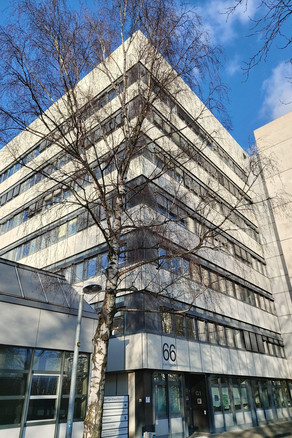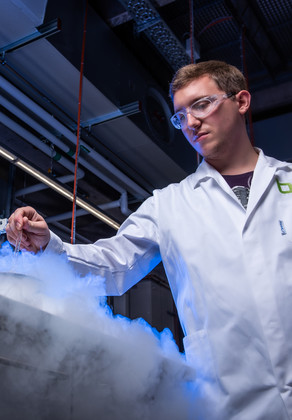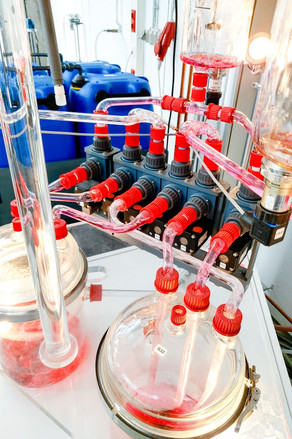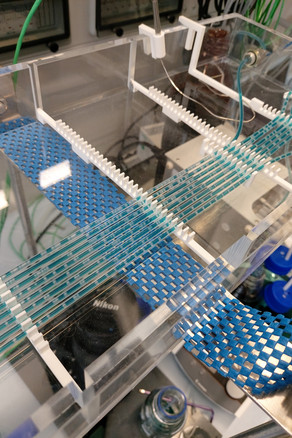What can you do after studying biochemical or chemical engineering?
You have a wide range of opportunities in many branches of industry, e.g. in the chemical, pharmaceutical, cosmetics, food, biotechnology or chemical industries, and the fields of application are also very different: developing new processes or improving existing ones, developing, operating or supervising apparatus, plant components or entire plants for biochemical and chemical engineering.
Biochemical and chemical engineers are people in demand. Read here what has become of our graduates, one click will take you to a detailed portrait.


Chemical plants today are usually huge. Columns, pipelines and reactors are lined up for kilometres, chimneys rise into the sky. Such plants are designed for large product quantities, because only in this way does the high time and investment expenditure in plant construction pay off. "In the specialty chemicals or pharmaceutical industries, we also need small, highly flexible production facilities for the future and therefore build them modularly in containers. Modular plants cannot handle huge quantities, but it is often also a matter of producing small quantities economically and reliably in terms of quality. The individual modules of our plants, such as the charging containers, which we call raw material templates, the columns or the reactors, always consist of the same 'kits'. This is the advantage of our idea. We are talking about really small modules; we could fit our test plant in a 20-foot container into a football goal."
From studies to research
Christoph wrote his diploma thesis on the construction of modular production plants. Now he works as a research assistant in a large EU research project on safety analyses and reliability considerations for modular production plants. Christoph is in the technical centre every day, where the new plants are tested. He shares his experience of the test runs with the team, in which experts from all over Europe work together. In addition to his research work, which will lead to a doctorate, Christoph continues to maintain close ties with TU Dortmund. For example, he supervises students' final theses.
Engineers don't just sit at their desks
"Just sitting at a desk? That's not why I became an engineer. I have a lot of opportunity to learn what chemical production actually is at our plants. That will benefit me after my doctorate. It's great that I can combine practical and theoretical work in my project. What advice do I have for students? Bite the bullet, it's worth it! And also think outside the box. I worked in Shanghai for half a year during my studies. My studies took a little longer because of that, but that's not bad. The experiences there were unique."
Even during her studies in Dortmund, she met many women who make bioengineering their profession, even though women are usually outnumbered in other engineering subjects. "I liked maths, biology and chemistry at school and I have always been enthusiastic about technology. So studying bioengineering was not far away. I also wanted to help preserve our environment. It's great that I can do that now in my daily work."
Out into practice
While most of her fellow students were still doing their Master's after the seven-semester Bachelor's, Michaela was already drawn away from the university library and into real life. Today she works in a company that recycles organic products and waste materials. "Of course, when I started my studies I didn't think I would work in the waste sector in the broadest sense. But it is so exciting! At the beginning, I could hardly believe it myself, how many recyclables there are in waste. We can no longer afford to waste them. My job as an engineer, for example, is to find new processes to isolate the recyclables and recycle them as effectively as possible." Turning chip fat into biogas, or burning organic waste to generate electricity, is nothing new these days. But existing processes can always be improved. Finding ways to do this and bringing them into the company is one of Michaela's tasks.
Ideas are not born at the "green table"
Fresh out of university, she knows the current technology and science, but she does not develop her ideas at the 'green table', but for the most part on site. "I don't only do my work at the PC or in meetings, but I also talk to people in production. Engineering work is not only mental work, I liked that already at university." While Michaela's work is about optimising processes, e.g. increasing the product yield in a certain process, she also tests completely new processes. A certain process to obtain new higher-value products that has never been realised before, or to work out improved technical possibilities to increase the value of current products, that's what she deals with. "What I like about my work? The fact that I am not a highly specialised expert for a limited field in a rather small company, but that I am in charge of very different tasks, from the idea to the implementation. I get around a lot, I do a meaningful job and also what I do best. Bioengineering is a dream job."
Ala Bouaswaig is at full steam when it comes to his work. His current project, however, is aimed precisely at ensuring that as little steam as possible is produced in production. Ala came to Dortmund from his home country of Libya to study chemical engineering. In the meantime he has completed his doctorate and is now working in a large chemical company on so-called "intelligent process control concepts". Production processes should be designed to be as smart and efficient as possible. Ala's ideas increase production output, reduce waste and help save energy and raw materials.
Concrete contribution to environmental protection
Ala's current project will reduce steam consumption in polymer production. Polymers are used in most chemical products, in cosmetics or car tyres, in insulating materials or packaging materials. "My work makes a concrete contribution to environmental protection, I like that. It's also great that I don't always have the same job, but have worked in several areas of the company. The duration of my projects is between six and twelve months, during which I work intensively on the assignment. First on the computer, because I can't try out my ideas directly in production; that wouldn't work in a large chemical plant. That's why I use computer models and simulations and test my ideas virtually first. Only when everything works on the computer do I move on to the real implementation."
Cooperation is important
"Good contact with the people on site is crucial for the success of a project. Engineers have to be able to communicate with other experts. Creative ideas and excellent knowledge of mathematics alone are not enough. I have fond memories of my time in Dortmund and of course I'm still a BVB fan."
Frederik Fritzsch has found a perfect mix of technology and natural science at his workplace, precisely the two areas that also prompted his desire to study bioengineering at the time. Frederik works in a company that has been developing products and services for pharmaceutical and medical research for over 20 years. Together with more than 1,300 experts worldwide, he develops devices for basic research in immunology, stem cell research, neuroscience and cancer research.
Frederik needs to know exactly
"We are specialists in the field of magnetic cell separation. In medical research, it is often important to know very precisely how individual cells, e.g. cancer cells circulating in the blood or stem cells, function. However, cells always occur in associations, from which they must therefore be separated. In the past, this required lengthy laboratory work. With the progressive development of microtechnologies, we can now carry out separation processes for single cell sorting automatically in the smallest of spaces. To do this, we have developed special disposables that make the processes cheaper, faster and safer." Frederik's employer has the know-how to isolate many different cell types. "The isolation is done with reagents that only bind to one very specific cell type at a time. The separation works magnetically and/or with the help of special dyes. Our devices separate many millions of cells at a stroke; the new microvalve developments sort over 10,000 cells per second individually."
Knowing the whole technical breadth
As a development engineer, Frederik brings together knowledge from many disciplines - and that's exactly what he enjoys. Thermodynamics, fluid mechanics, materials science, software engineering, biology - all these fields play a role. But he couldn't be successful in his work if he weren't also a thoroughbred team player and fit in work organisation and project management. "Always keeping an overview is not so easy, because I usually have a lot of balls in the air, the tasks are complex and active communication work is extremely important. Our teams include natural and engineering scientists, specialists in software technology and electronics, but also product or marketing experts and other fields. With my work I contribute to the fact that we all pull together so that in the end the desired product is created."
Knowing what customers want
"Of course, a product has to be marketable, i.e. our customers have to see a benefit when they buy it. To do this, I need to know what their daily work is like, what makes them tick and what key challenges they face. When a new device fulfils these wishes, we make our customers' work easier, simpler and faster. I am proud to be able to contribute to better health for people through my work."
A lot of electricity is consumed in the manufacture of chemical products. Reducing energy consumption and, of course, using all other resources responsibly is therefore an important issue worldwide. Saving here brings multiple benefits: It benefits the company because it reduces costs, it benefits the employees because their jobs remain secure and it benefits the environment. Optimising processes so that resources and energy are used more efficiently is an important task for many engineers, including Jan Caaßens.
Efficient processes improve environmental protection
Jan studied bioengineering in Dortmund and, at one of Germany's largest chemical companies, ensures, among other things, that energy is used efficiently in the manufacture of chemical products. His company produces products for the generation and storage of renewable energies, for example, but also for the pharmaceutical and food industries. The new process approaches Jan is working on will also save a lot of energy in the future. "My idea is to use energy that is generated in one part of a process for other parts of the process. We engineers call this 'energy integration'. Energy integration can reduce the total energy required for the process."
Being an engineer means working in a team
Jan likes to fiddle with technical solutions. "But puzzling is only one side of my work. I will also be there when the new concept is implemented from planning to reality. Only in practice will it ultimately become apparent that my idea really works one hundred per cent. Working with my colleagues in the team is an exciting thing. There I get suggestions and feedback on my concepts. With the energy we will save, we will make an important contribution to climate protection and help conserve natural resources."
Doris Lawrenz studied chemical engineering in Dortmund in the 1980s. Her career path led her via a large chemical plant construction company to a small engineering office, where she can now easily reconcile work and family life, as she has a daughter whom she is raising alone.
Projects from Germany to the Galapagos Islands
Doris looks out of her office window into the Teutoburg Forest, but professionally her contacts reach all over the world - to Spain, Poland, Ecuador and the USA. As different as the places are, as different are her projects and as diverse are the tasks she has to solve as an engineer in food technology: A Spanish manufacturer wants to automate the production of fruit jellies for its ice cream- Doris designs the system. An edible oil manufacturer in Germany wants to expand its production, but has no space on its premises for new machinery- Doris finds the solution by setting up a new plant within an existing one.
Development aid for Ecuador
For the Galapagos Islands, Doris worked on a plant that uses jatropha oil for energy production. Using jatropha oil has two advantages that are important for sustainability: It is not produced from monocultures and it is slightly toxic and therefore not edible, so there is no problem regarding food prices. The farmers of Manabi harvest the seeds from the abundant hedgerows on the edges of their fields, gaining a little extra income on top of their meagre income. The collected seeds are pressed into oil, which is then used in the power generators. Of course, large amounts of energy cannot be generated this way, but the Jatropha oil generators are important as a backup solution so that the lights don't go out on Galapagos even on days without sun or wind.
There is no such thing as boredom
"Working in a small engineering company is very appealing because we focus on very specific plants and customer needs. Our food plants are smaller than those of large plant construction companies, and they are not built 'on the assembly line'. Every customer has his or her own special requirements and problems; solutions are developed in a joint exchange and are always very individual. So I won't get bored in the next twenty years either. What I also enjoy is working in a family atmosphere. I see my managing director every day, unless I'm on the road."





![[Translate to English:] [Translate to English:]](/storages/bci/_processed_/e/4/csm_Kopfbild_Interested_small_b7cbe22ab2.jpg)